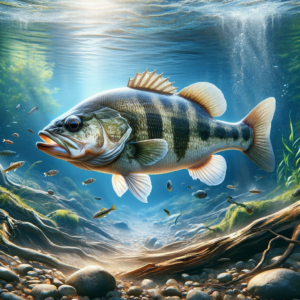Have you ever wondered just how intelligent smallmouth bass are? I mean, they are just fish, right? But when you take a closer look, you might be surprised to learn how incredibly intelligent these fish can be. In this article, we will delve into the topic of the intelligence of smallmouth bass and explore just how clever these creatures really are.
When it comes to intelligence, smallmouth bass demonstrate a range of impressive behaviors. They have the ability to learn from past experiences and adapt their behavior accordingly. For example, studies have shown that they can remember and recognize specific feeding spots, even after several months of not visiting those locations. They also exhibit problem-solving skills, such as using rocks or other objects to dislodge prey hidden in crevices.
Furthermore, smallmouth bass are capable of social learning, which means they can observe and imitate the behavior of other fish. This allows them to acquire new skills and strategies, such as how to avoid predators or find food in challenging environments. Their ability to learn from one another demonstrates a level of social intelligence that is quite remarkable for a fish.
In conclusion, the intelligence of smallmouth bass is far more sophisticated than one might initially assume. Their ability to learn, adapt, and problem-solve makes them fascinating creatures to study. In the following article, we will explore the various ways in which researchers have tested and measured the intelligence of smallmouth bass, providing further evidence of their remarkable cognitive abilities.
The Intelligence of Smallmouth Bass
Fish, particularly smallmouth bass, may not be the first creatures that come to mind when thinking about intelligence. However, these underwater inhabitants possess unique qualities that demonstrate their remarkable cognitive abilities. This article will explore the physical characteristics, feeding behavior, social behavior, hunting techniques, problem-solving abilities, communication methods, memory and learning, sensory perception, and adaptive skills of smallmouth bass, shedding light on their undeniable intelligence.
Physical Characteristics
Smallmouth bass are renowned for their distinctive physical traits. With an elongated body, they typically measure around 12 to 24 inches in length and weigh between 2 to 6 pounds. Their coloration varies but includes shades of brown, olive, and bronze, blending effortlessly with their surroundings. Additionally, smallmouth bass possess a jagged dorsal fin and a lower jaw that extends beyond the upper, giving them their characteristic appearance.
Feeding Behavior
Smallmouth bass are opportunistic predators, showcasing their intelligence through their feeding behavior. These fish are equipped with a voracious appetite and a keen sense of sight, allowing them to identify prey with precision. They feed on a wide range of food sources, including insects, small fish, crayfish, and even smaller bass.
Social Behavior
Smallmouth bass exhibit fascinating social behavior, forming loose aggregations during certain periods of the year. While they are typically solitary creatures, there are instances where these fish come together in schools or groups. Their social interactions involve various communication methods, enabling them to establish hierarchies and cooperate in hunting and protection.
Hunting Techniques
When it comes to hunting, smallmouth bass employ a combination of patience and strategy. These fish have the ability to lurk beneath the water’s surface, motionless for extended periods, waiting for prey to come within striking range. Their exceptional eyesight and lateral line system, which detects subtle movements in the water, allow them to pinpoint potential meals with remarkable accuracy.
Problem-Solving Abilities
Although smallmouth bass lack the advanced problem-solving abilities of mammals, their cognitive capacities should not be overlooked. In controlled experiments, smallmouth bass have been observed demonstrating problem-solving skills, such as navigating through mazes or memorizing the location of hidden food sources. These abilities suggest a level of intelligence that extends beyond basic instinct.
Communication Methods
While smallmouth bass may not communicate through audible sounds like mammals, they rely on other communication methods. They use their lateral line system to detect vibrations in the water, allowing them to communicate with other fish and detect potential threats. Additionally, smallmouth bass employ body language, such as fin movements and postures, to convey messages to their fellow aquatic companions.
Memory and Learning
Smallmouth bass exhibit a remarkable capacity for memory and learning. These fish have been shown to remember specific locations of food sources, even after significant periods of time. Moreover, they have the ability to learn from past experiences and adapt their behaviors accordingly. This indicates their intelligence extends beyond instinctual responses.
Sensory Perception
The sensory perception of smallmouth bass is a crucial aspect of their intelligence. Their lateral line system enables them to detect even the slightest disturbances in the water, helping them locate prey and avoid potential dangers. Additionally, smallmouth bass possess excellent vision, enabling them to navigate murky waters and identify potential threats with remarkable precision.
Adaptive Skills
Smallmouth bass demonstrate impressive adaptive skills, allowing them to survive in various environments. They have the ability to adjust their feeding behavior depending on the abundance of different food sources, ensuring their survival in changing conditions. This adaptability is a testament to their intelligence and their ability to make informed decisions based on environmental cues.
Conclusion
In conclusion, smallmouth bass possess a level of intelligence that is often underestimated. These fish exhibit remarkable physical characteristics, feeding behaviors, social behaviors, hunting techniques, problem-solving abilities, communication methods, memory and learning, sensory perception, and adaptive skills. Their ability to navigate their environment, learn from experiences, and communicate with one another showcase their undeniable intelligence. While smallmouth bass may not possess the cognitive abilities of mammals, they are undoubtedly intelligent creatures in their own right.




